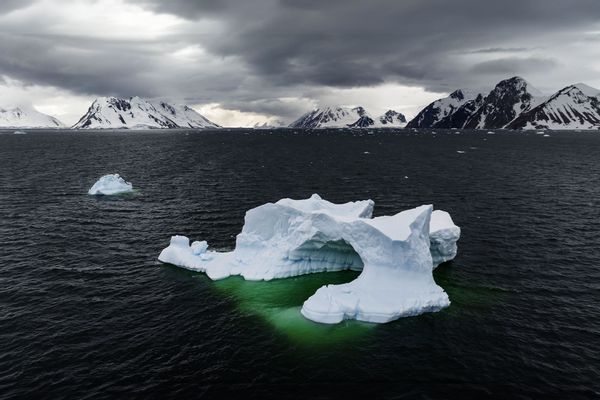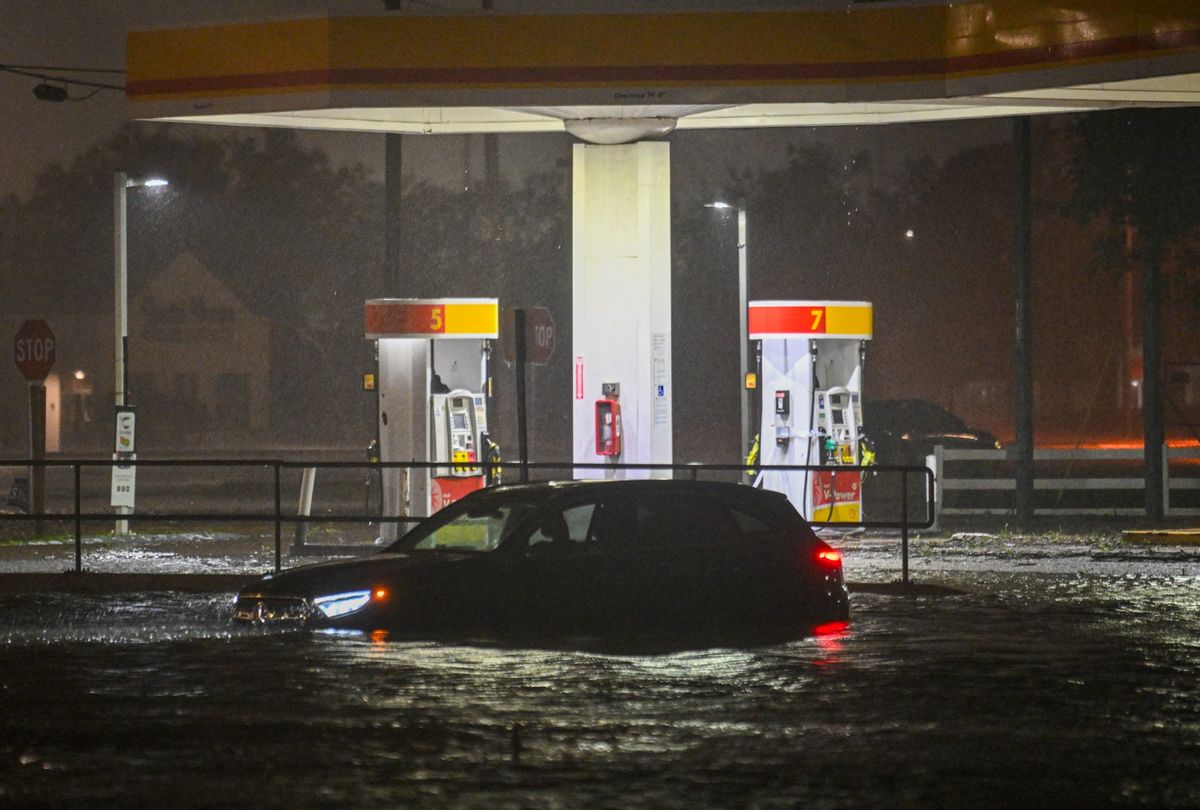The year 2024 is on track to be the hottest in recorded history, as humanity has officially exceeded the 1.5º C threshold established by the 2015 Paris climate accord. Despite this milestone, President-elect Donald Trump is pushing environmental scientists out of the government. According to Dr. Mark Serreze and many other climate scientists who spoke with Salon, the new reality created in 2024 by unprecedented rising temperatures is the biggest news story today, despite relative lack of coverage. It raised many unanswered questions — as well as ominous prospects for the future of our species.
“While this fact is an exclamation point on global warming, it is also telling us that we have much more to learn,” Serreze, director of the National Snow and Ice Data Center (NSIDC), told Salon. Scientists like Serreze want to learn why the planet is so much warmer than even they had predicted. Dr. Peter Kalmus, a NASA climate scientist who emphasized his opinions are his own, noted that heating is accelerating “and is now substantially more rapid (0.26° C per decade) than it was a decade ago.”
Dr. Ken Caldeira, an atmospheric scientist at the Carnegie Institution for Science's Department of Global Ecology, observed that from the perspective of scientists who dedicate their careers to studying climate systems, one major question is whether the current temperature spikes occurred because the previous El Niño cycle gave humanity years of relative relief from temperature increases.
“Will 2025 be another record breaking year, or will it be another hot, but not record hot, year?” Caldeira said. “Many scientists think the recent hot years were largely attributable to a super-position of El Niño variability on top of a greenhouse gas-induced warming trend, but some see the recent years as an acceleration in the underlying warming trend."
"This and other indicators show clearly that the Arctic is in a new regime that is overall hotter and wetter."
Other scientists, including Caldeira, hope that mitigation strategies like carbon restrictions will slowly push back against the warming trend.
This is not to say that scientists do not agree for sure on one important thing: Overwhelming scientific evidence indicates humans are burning fossil fuels at an unsustainable rate, releasing gases such as carbon dioxide and methane into the atmosphere. As these so-called greenhouse gases trap excess heat, they cause extreme weather events like wildfires, hurricanes and droughts, as well as rising sea levels.
As such, 2024’s distinction as the warmest year in human history “underscores the reality that the planet will continue to warm as long as we burn fossil fuels and add carbon pollution to the atmosphere,” Dr. Michael E. Mann, a climatologist from the University of Pennsylvania, told Salon. Dr. Twila Moon, the deputy lead scientist and science communication liaison at the NSIDC, also pointed out that 2024 was also the second hottest year on record in the Arctic, and that the previous nine years were the nine hottest years in a dataset that goes back to 1900.
“This and other indicators show clearly that the Arctic is in a new regime that is overall hotter and wetter,” Moon said. “Every year in the Arctic now looks dramatically different than even a couple of decades ago. Yet, this new regime is not a new normal because human-caused climate change will continue to bring rapid and ongoing change to the Arctic, and our entire globe.”
Want more health and science stories in your inbox? Subscribe to Salon's weekly newsletter Lab Notes.
These statistics are more than abstract trivia — they will have a direct impact on the lives of human beings everywhere. For example, 2024 had the deadliest hurricane season in almost two decades, after Hurricane Katrina hit in 2005.
“This underscores how hurricanes are becoming more intense and more deadly as the planet continues to warm,” Mann said. In addition to causing more than 400 deaths, the 2024 Atlantic hurricane season was accompanied by 24 climate change-exacerbated weather disasters in the United States alone that each racked up more than $1 billion in damages. These events included devastating storms like Hurricane Milton and Hurricane Helene.
“This underscores the profound impact that human-caused climate change is already having in the form of devastating extreme weather events that threaten our economy and, increasingly, our lives,” Mann said. These impacts are likely to continue worsening, with Moon pointing out that global fossil fuel emissions are set to reach a new record in 2024.
 An aerial view of an iceberg while scientists conduct a research on effects of climate change during 8th National Antarctic Science Expedition organized by TUBTAK MAM Polar Research Institute as they have discovered that ice cuticles, sized as much as Turkiye, melted due to the effects of climate change in Antarctica, which is described as the coldest and driest continent of the planet on February 8, 2024. (Sebnem Coskun/Anadolu via Getty Images)“This human release of heat-trapping gasses is the primary cause of the increases in extreme weather, flood, drought, heatwaves and generally ‘weird weather’ that we are all experiencing,” Moon said. “It is well known that reducing these emissions is key to minimizing risk and damage into the future. And how to achieve these reductions is well mapped out, with the technology to do it. The pressure is now focused on social, cultural, business and political will.”
An aerial view of an iceberg while scientists conduct a research on effects of climate change during 8th National Antarctic Science Expedition organized by TUBTAK MAM Polar Research Institute as they have discovered that ice cuticles, sized as much as Turkiye, melted due to the effects of climate change in Antarctica, which is described as the coldest and driest continent of the planet on February 8, 2024. (Sebnem Coskun/Anadolu via Getty Images)“This human release of heat-trapping gasses is the primary cause of the increases in extreme weather, flood, drought, heatwaves and generally ‘weird weather’ that we are all experiencing,” Moon said. “It is well known that reducing these emissions is key to minimizing risk and damage into the future. And how to achieve these reductions is well mapped out, with the technology to do it. The pressure is now focused on social, cultural, business and political will.”
Caldeira echoed Moon’s observation about the need for America’s leaders to be serious about the threat posed by climate change.
“On the politics side, the big question is what Trump and the MAGA gang will do to Biden's legislative achievements in the climate arena,” Caldeira said, referring to President Joe Biden’s various executive and legislative reforms intended to address climate change.
We need your help to stay independent
“One view is that the drive for vengeance and destruction (and tax breaks!) is so strong that they will try to eliminate the incentives that were created in the infrastructure and inflation reduction laws,” Caldeira said. “Another view is that since, reportedly, 85% of the benefit accrues to Republican districts, this is essentially a subsidy from blue districts to red districts that the Republicans might not want to give up.”
Kalmus is cynical about the future. He pointed out that at the 2024 United Nations Climate Change Conference, more than 1,700 fossil fuel lobbyists were present to push back against efforts to curb carbon emissions.
“Everything is getting worse, fast — and instead of stopping it, the billionaire class has the pedal to the floor,” Kalmus said. “This will set the stage for reduced habitability on our planet for an extremely long time. Biodiversity could take millions of years to recover. It could lead to billions of human deaths, unimaginable suffering, and limit the possibilities for our species far into the future.”



Shares